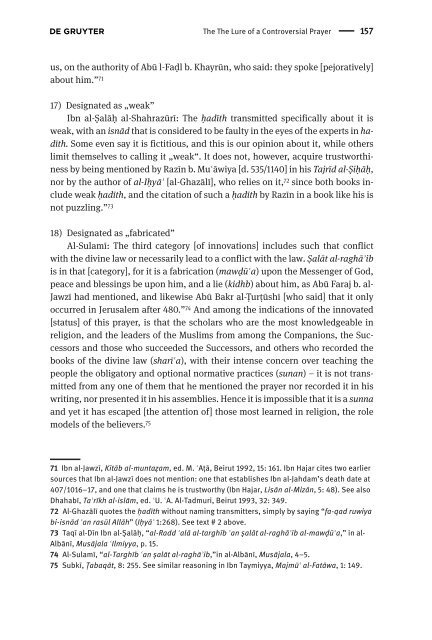0021-1818_islam_98-1-2-i-259
0021-1818_islam_98-1-2-i-259
0021-1818_islam_98-1-2-i-259
Create successful ePaper yourself
Turn your PDF publications into a flip-book with our unique Google optimized e-Paper software.
The The Lure of a Controversial Prayer 157<br />
us, on the authority of Abu l-Fadl b. Khayrun, who said: they spoke [pejoratively]<br />
about him.” 71<br />
17) Designated as „weak”<br />
Ibn al-Sala1 al-Shahrazur\: The hadith transmitted specifically about it is<br />
weak, with an isnad that is considered to be faulty in the eyes of the experts in hadith.<br />
Some even say it is fictitious, and this is our opinion about it, while others<br />
limit themselves to calling it „weak“. It does not, however, acquire trustworthiness<br />
by being mentioned by Raz\n b. Mu^awiya [d. 535/1140] in his Tajrid al-Sihah,<br />
nor by the author of al-Ihya# [al-Ghazal\], who relies on it, 72 since both books include<br />
weak hadith, and the citation of such a hadith by Raz\n in a book like his is<br />
not puzzling.” 73<br />
18) Designated as „fabricated”<br />
Al-Sulam\: The third category [of innovations] includes such that conflict<br />
with the divine law or necessarily lead to a conflict with the law. Salat al-ragha#ib<br />
is in that [category], for it is a fabrication (mawdu^a) upon the Messenger of God,<br />
peace and blessings be upon him, and a lie (kidhb) about him, as Abu Faraj b. al-<br />
Jawz\ had mentioned, and likewise Abu Bakr al-Turtush\ [who said] that it only<br />
occurred in Jerusalem after 480.” 74 And among the indications of the innovated<br />
[status] of this prayer, is that the scholars who are the most knowledgeable in<br />
religion, and the leaders of the Muslims from among the Companions, the Successors<br />
and those who succeeded the Successors, and others who recorded the<br />
books of the divine law (shari^a), with their intense concern over teaching the<br />
people the obligatory and optional normative practices (sunan) – it is not transmitted<br />
from any one of them that he mentioned the prayer nor recorded it in his<br />
writing, nor presented it in his assemblies. Hence it is impossible that it is a sunna<br />
and yet it has escaped [the attention of] those most learned in religion, the role<br />
models of the believers. 75<br />
71 Ibn al-Jawz\, Kitab al-muntazam, ed. M. ^Ata, Beirut 1992, 15: 161. Ibn Hajar cites two earlier<br />
sources that Ibn al-Jawz\ does not mention: one that establishes Ibn al-Jahdam’s death date at<br />
407/1016–17, and one that claims he is trustworthy (Ibn Hajar, Lisan al-Mizan, 5: 48). See also<br />
Dhahab\, Ta#rikh al-<strong>islam</strong>, ed. ^U. ^A. Al-Tadmuri, Beirut 1993, 32: 349.<br />
72 Al-Ghazal\ quotes the hadith without naming transmitters, simply by saying “fa-qad ruwiya<br />
bi-isnad ^an rasul Allah” (Ihya# 1:268). See text # 2 above.<br />
73 Taq\ al-D\n Ibn al-Sala1, “al-Radd ^ala al-targhib ^an salat al-ragha#ib al-mawdu^a,” in al-<br />
Alban\, Musajala ^Ilmiyya, p. 15.<br />
74 Al-Sulam\, “al-Targhib ^an salat al-ragha#ib,”in al-Alban\, Musajala, 4–5.<br />
75 Subk\, Tabaqat, 8: 255. See similar reasoning in Ibn Taymiyya, Majmu^ al-Fatawa, 1: 149.


